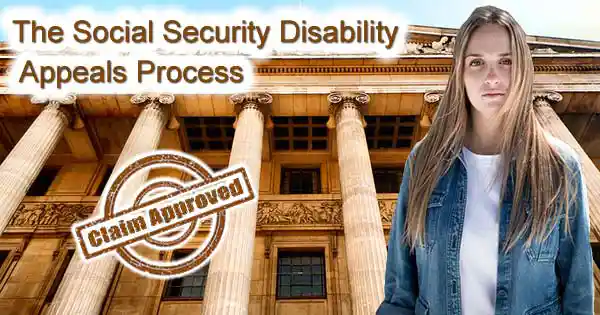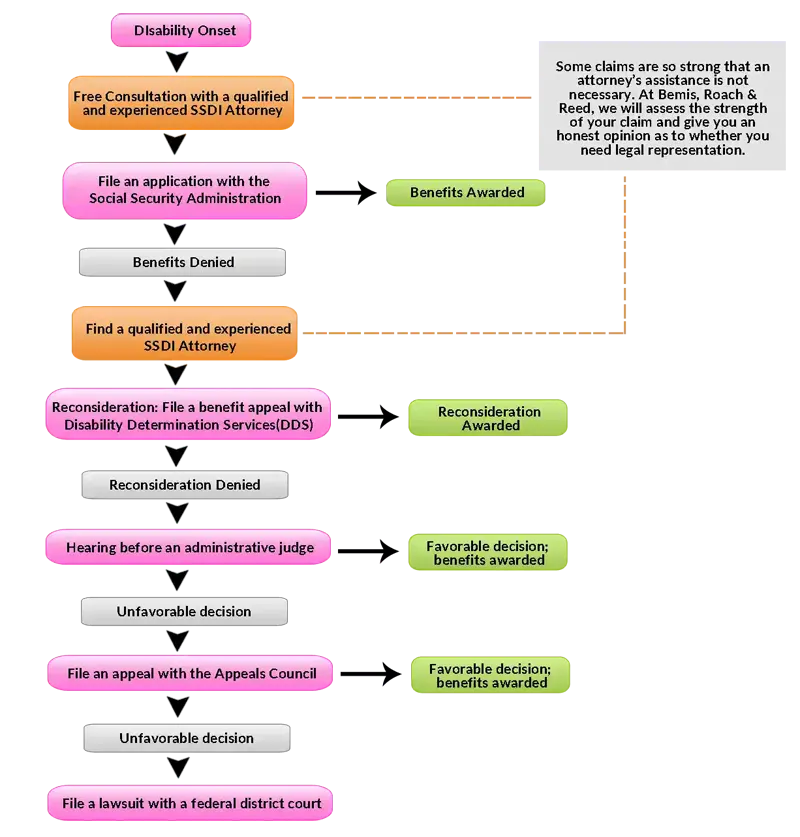The Social Security Disability Appeals Process
Author: Attorney Lloyd Bemis
Updated: 7/10/2024
The Social Security Disability Appeals Process has four levels of appeal:
Each step must be completed before continuing to the next level.
- Request for Reconsideration
- Request for a hearing before an Administrative Law Judge (ALJ)
- Appeals Council review.
- Federal Court review.
The Social Security Disability Appeals Process
If your initial claim for disability benefits was denied, you should understand that this is not the end of the process, but just the beginning. Most claims are denied when initially submitted, but that does not mean you cannot be approved for disability benefits.
My SSDI claim was denied, now what do I do?
67% percent of claims for disability benefits are denied when initially submitted.
Applications for SSDI can be denied for a number of reasons – filling out a form incorrectly, incomplete medical documentation, not enough work history, not keeping up with prescribed medical treatments. After being denied, many people just give up all together or maybe reapply again at a later date. Neither of these choices is wise. Denial of your initial application does not mean you are not disabled. Re-applying will only delay the process and chances are you will be denied again.
You should strongly consider filing an appeal.
Half the applicants who appeal their denial are approved for benefits in the future.
You will have 60 days to request an appeal after receiving your denial letter.
The request must be in writing. An applicant may also call the Social Security administration and request an appeal form (Form SSA-561). The fastest and perhaps easiest way to appeal a case is by filing online at www.socialsecurity.gov/disability/appeal. If you have gone past your 60 days, do not worry; you can still file a “Request for Reconsideration” but you will need to submit a written statement describing a good cause for filing late. If you do not have a good reason, you can file a new claim immediately, but this will significantly impact your possible approval timeline.
There are four levels to the appeals process.
Each step must be completed before continuing to the next level.
- Request for Reconsideration
- Request for a hearing before an Administrative Law Judge (ALJ).
- Appeals Council review.
- Federal Court review.
1. Request for Reconsideration.
The first step you need to take is to submit a Request for Reconsideration within 60 days of receiving the denial notice.
In this step an applicant simply asks the Social Security Administration to completely review their case again. This review is performed at Disability Determination Services (DDS) by a medical consultant and examiner who had no part in reviewing the initial claim. Only 10-15% of all requests for reconsideration are awarded benefits, but there is a chance for approval. Fresh eyes on your case can make a difference. If your claim is denied again, you will receive another letter like the first denial notice stating why the claim was denied. A denial at this level is not unlikely and you will most likely need to move to the next level of appeal, which is requesting a hearing before an Administrative Law Judge.
2. Hearing before an Administrative Law Judge (ALJ).
If your Request for Reconsideration is denied, you may request a hearing before an ALJ, but you must do it within 60 days of receiving the denial notice.
Administrative Law Judges are attorneys who work for the Social Security Administration Office of Hearings and Operations. They review SSDI cases and either uphold or overturn decisions to deny SSDI benefits or terminate disability benefits. This step is your best chance to win your claim as approximately 50% of applicants who take their cases to an ALJ win approval on appeal and begin receiving SSDI benefits. This opportunity is not to be taken lightly, and you will need to appear at the hearing either in person, via videoconference, or telephone to present your case to the ALJ. Understanding exactly what the court is looking for, and presenting your claim in a favorable light can be very challenging, and being represented by a dedicated disability advocate would be an advantageous choice for anyone at this level of appeal. You certainly don’t need to hire our attorneys, but you should strongly consider finding someone to help you at this point. This is your best chance to secure the financial assistance you are seeking.
3. Appeals Council.
If your claim gets denied at the ALJ hearing, you can request that the Appeals Council review their case.
The primary duty of the Appeals Council is not to assess the merits of an individual’s disability claim, but rather to examine the ALJ’s decision for any legal or procedural mistakes and determine if there was enough evidence to support the judgment. The Appeals Council can also dismiss a case if an applicant files late, requests a dismissal of their claim, or dies. You have 60 days from the date of the ALJ’s decision to submit a request for review by the Appeals Council. You must file the request in writing using Form-HA520.
The Appeals Council can:
- Deny your Request for Review. If they deny your request they will not grant benefits and will not send your case back to the ALJ for another hearing.
- Issue a new decision, granting benefits if they believe the evidence supports it. This occurs only about 3% of the time.
- Return the case to the ALJ for a new hearing.If the Appeals Council finds a technical error occurred in the ALJ’s decision, they will return the case to the ALJ for another hearing. This occurs approximately 22% of the time.
It typically takes the Appeals Council a long time to evaluate a case; the average period being 345 days.
If your claim gets denied by the Appeals Council, you will then have 60 days to file an appeal in U.S. District Court.
4. Federal Court Review.
The final step in the appeal process is filing suit in U.S. District Court.
If you are not already represented by an attorney at this point, you certainly need to obtain legal counsel for a suit in U.S. District Court. Federal judges hear SSDI cases without juries. The responsibility of the federal judge is to review a case for legal errors, but judges can rule on certain factual questions. Very few decisions by ALJs or the Appeals Council are reversed at the district court level. Instead, many federal judges remand (or send back) cases to the Social Security Administration, stating that the SA did not consider a doctor’s opinion sufficiently, or an applicant’s pain or other symptoms, or the agency should have requested assessments from treating doctors. Though there is a fair chance of winning a case at this level, lawsuits are expensive and time consuming. Not all disability attorneys are willing to go to court and less than 1% of SSDI applicants pursue their claims that far.
Can I appeal the decision if the Social Security Administration terminates my benefits?
The SSA will periodically review individuals currently receiving disability benefits in order to verify their continued disability status and eligibility for SSDI. This is known as a continuing disability review or CDR. Social Security may decide to terminate your benefits if it finds that your condition has improved to the point that you are capable of working. It may also terminate your benefits if you fail to cooperate with the review process. If they decide to terminate your benefits, you can appeal the decision by requesting a Reconsideration of Continuing Disability Review at a hearing before a disability hearing officer (DHO). Your case will once again be reviewed by the Disability Determination Services (DDS) before it is sent to the DHO. DHOs are permitted to form their own opinions about your physical and mental condition and there is a chance that they will reverse the termination of your benefits. If your claim is still denied, the next step would be to once again, request a hearing before an ALJ.
Will my disability benefits continue while I appeal?
In some circumstances you may ask Social Security to continue paying benefits while they review your case; for example, when a claimant appeals a decision that they are no longer eligible for SSDI benefits. If you want benefits to continue, you must contact the Social Security Administration within 10 days of receiving Social Security’s letter stating that your benefits are terminated. Note that in the event your appeal is denied, you will have to pay back any money you were not eligible to receive.
When should I contact a disability attorney?
It’s never too early to contact a disability attorney. An experienced disability attorney can evaluate your case and help you file your claim, gather medical evidence, and obtain medical tests and necessary documents. They will know what is required at each step of the process, keep track of deadlines and be able to present your case in the best possible light. Additionally, a disability attorney can help determine if you are eligible for a fast-track decision. Under certain circumstances, such as a terminal illness or extreme poverty, Social Security will shorten the claim processing time.
Appealing an SSDI case can be a long, frustrating process but can potentially be a very worthwhile effort to obtain the financial assistance you rightfully deserve.
FAQs Section
What are the four levels of the Social Security Disability Appeal process?
Each step must be completed before continuing to the next level.
- Request for Reconsideration
- Request for a hearing before an Administrative Law Judge (ALJ)
- Appeals Council review.
- Federal Court review.
Which step of the Social Security disability appeals process is the most important?
If your Request for Reconsideration is denied, you may request a hearing before an ALJ, but you must do it within 60 days of receiving the denial notice.
Administrative Law Judges are attorneys who work for the Social Security Administration Office of Hearings and Operations. They review SSDI cases and either uphold or overturn decisions to deny SSDI benefits or terminate disability benefits. This step is your best chance to win your claim as approximately 50% of applicants who take their cases to an ALJ win approval on appeal and begin receiving SSDI benefits.
How long do I have after receiving my SSDI disability denial letter to file an appeal?
You will have 60 days to request an appeal after receiving your denial letter.
The request must be in writing. If you have gone past your 60 days, do not worry; you can still file a “Request for Reconsideration” but you will need to submit a written statement describing a good cause for filing late. If you do not have a good reason, you can file a new claim immediately, but this will significantly impact your possible approval timeline.
Disability benefits are an important source of income for those who are unable to work. If you are not able to work due to accident or illness, you may be eligible for Social Security Disability or Long Term Disability benefits. If you have applied for benefits and been denied, contact the attorneys at Bemis, Roach and Reed for a free consultation. Call 512-454-4000 and get help NOW.
Try these links for further reading on this subject:
Appealing a Denied Claim with Texas Disability Lawyers
Prepare for your SSDI Hearing
Austin Social Security Disability Lawyers

Your Free Initial Consultation
Call now:
At Bemis, Roach and Reed, if we can't help you, we will try to find the right attorneys for you.
We offer each of our prospective clients a free no obligation one hour phone or office consultation to see if we can help you and if you are comfortable with us. We know how difficult a time like this can be and how hard the decisions are. If we can be of assistance to you and help you find a solution to your issue we will, even if that means referring you to another attorney.
Let's get you Started:
If you could provide us with some basic information about your claim we will get right back with you with a free case evaluation and schedule your Free Consultation Today.
You can also email us at: contact@brrlaw.com
Kind Words from Our Clients
“The attorneys and staff at Bemis, Roach & Reed have provided me and my husband, Jeff, with stellar advice, care, and service. They made navigating the SSDI process easy, painless, and as timely as possible. During this difficult time in our lives it was a tremendous relief to know they were on our side and keeping us updated on next steps and timelines. We also had questions about my husband’s long term disability insurance and they helped us get those questions answered and resolved without any additional fee. I highly recommend Bemis, Roach & Reed.” – Kelli G
“I needed a lawyer for my case and had googled best lawyers. They came up first on my list and decided to give them a call. From the moment I called I knew I chose the right people. They said they would fight for me and fight they did. They knew what they were doing and kept good communication throughout the process. If you need someone that will listen, understand, and fight then these are the people. HIGHLY RECOMMEND.” – Marcel L.
“I’ve had a great experience working with Bemis, Roach & Reed for my disability case. I spent two years fighting on my own, until I was informed to look for a disability lawyer. Right away, sending in questions was a breeze, and from the moment my case was accepted, everything became a major weight off my shoulders. My newest appeal was filed for me, my medical records and case history sorted for me, and I could finally focus on my appointments and treatment with a little less worry. Everything was explained to me in a way that made sense, the process was set out in an easy to understand way. And, just like that, at the beginning of July 2023, my claim was accepted!” – Sunshinemutt








